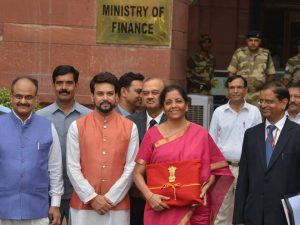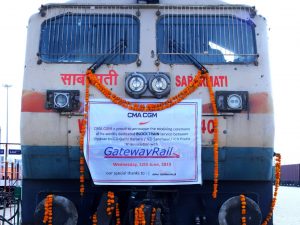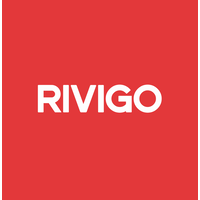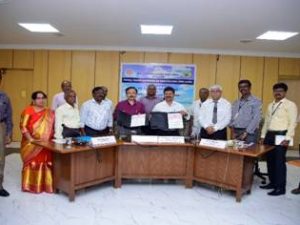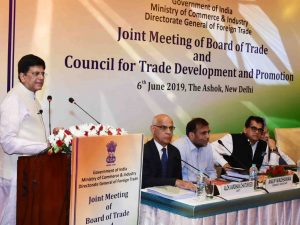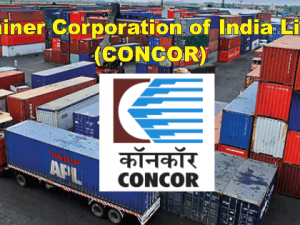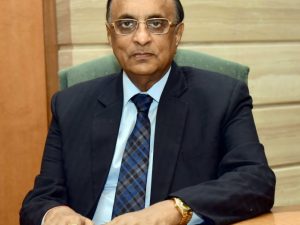Believing the Budget 2019-20 as an ongoing task reiterating the commitments that the NDA Government has set in its vision document, S Ramakrishna, Chairman, FFFAI, says, “It is commendable the new Finance Minister presented a pragmatic Budget aiming to reach the US$ 5 trillion economy in the next few years, with required emphasis and focus on infrastructure, multimodal connectivity and logistics operation. Significantly, the government has decided to create and promote inland waterways and allied infrastructure to reduce logistics cost and boost greener environment.” It is heartening to note that after recently launched multimodal terminal at Varanasi, more similar terminals will be completed at Sahibganj and Haldia and a navigational lock will be created at Farakka by 2019-20 FY. We will be expecting more such terminals in North East India as well, like strengthening the existing terminal in Pandu (Guwahati) and new one in Jogighopa which is very strategic region from foreign trade’s perspective utilizing effective multimodal connectivity with special thrush on waterways. It would be very crucial to expedite international cargo movement to Bangladesh and beyond. Also, it is commendable the Finance Minister emphasized on resolving all litigations on fast track basis to facilitate trade and commerce. Commenting on the focus given by government to MSMEs, Ramakrishna, says, “Since predominantly we are from MSME sector, this funding would be a great boost for us.”
Read More »River and national highway network in focus in Union Budget 2019-20
“India is set to become a $3 trillion economy this year and it is well within its capacity to reach the $5 trillion economy by 2024,” says Nirmala Sitharaman, Finance Minister, Government of India, while presenting the annual Budget. The Budget says that the government will examine steps to hike FDI cap in aviation. Government envisions using river for cargo transportation which will also decongest roads and railways. “The movement of cargo on Ganga is estimated to rise four times in four years,” informs Sitharaman. GST processes will also get simplified further. The government has given massive push for physical infrastructure too. 125,000 km of road to be upgraded over next five years at a cost of Rs 802.5 billion. To ensure the creation of National Highways Grid of desirable capacity, comprehensive restructuring of National Highways Programme will be done. Railway infrastructure would need an investment of Rs 50 lakh crore between 2018 and 2030; PPP to be used to unleash faster development and delivery of passenger freight services, says Finance Minister. “Will simplify procedures, reduce red tape, make best use of tech,” says Sitharaman, in adding, “Building social infrastructure, digital India, Pollution-free India and Make in India are government vision.”
Read More »CMA CGM commences weekly scheduled block train from Port Pipavav
CMA CGM has started weekly service of a dedicated scheduled import train from Port Pipavav to Garhi Harsaru (NCR region), which it received on June 12. Operated by Gateway Rail Freight (GRFL), the import train, that connects Pipavav to Garhi, Ludhiana and Piyala, has a capacity of 180TEUs in a single run. The scheduled train service will provide reliable, safe and quick transport of commodities to the NCR region. The seamless transport and scheduled deliveries will help the trade to optimise their supply chain.
Read More »Rivigo launches National Freight Index (NFI) for roadways
In a bid to bring transparency to the road freight marketplace, Rivigo has launched the National Freight Index (NFI). This first-of-its-kind barometer of the road freight market in India is based on a Rivigo rate exchange, which gives a live spot rate on over seven million lane and vehicle type combinations in the country. NFI offers an aggregated picture of both live rates and historical trends of spot price movements in the road freight industry. The index is represented in two main forms; in terms of actual freight rates condensed to INR per tonne-km and in terms of relative movement with respect to a base month. Gazal Kalra, Co-Founder, Rivigo, said, “In the existing logistics market structure, there are high inefficiencies due to information asymmetry, which leads to a great loss of value. NFI will enable unrestricted access and sharing of freight rate information. This will bring transparency in the market and propel the logistics sector towards efficiencies and growth.”
Read More »VO Chidambaranar Port Trust Tuticorin, inks MoU with Central Warehousing Corporation
The VO Chidambaranar Port Trust, Tuticorin and Central Warehousing Corporation (CWC) have signed a Memorandum of Understanding (MoU) for facilitating Direct Port Entry (DPE) of e-sealed factory stuffed export container to the port under ‘ease of doing business’. With this MoU, CWC would make use of the 18,357 sqm area earmarked in the truck parking terminal for operating and managing the DPE facility for 30 years on annual lease rental basis. The DPE facility would enable direct movement of containers from factories without intermediate handling requirement at any Container Freight Station thus facilitating the shippers to gate-in their factory-stuffed goods directly to the container terminal 24×7.
Read More »Ministry of Commerce & Industry to synergise export promotion and internal trade: Goyal
In a joint meeting with Board of Trade and Council of Trade Development & Promotion, Piyush Goyal, Union Minister of Commerce and Industry & Railways, said, “Ministries/departments can no longer work in isolation for effective outcome of government policy. Easier availability of credit at cheaper rates to exporters will be resolved expeditiously and customs clearances will be made quicker by installing X-ray scanners at all major ports. Robust mechanism for track & trace in the pharma sector will be implemented in three months, a new scheme to rebate state and central taxes and levies will be rolled out in three months and will be implemented in a phased manner for all sectors.” Specific action points for the implementation of new Agricultural Export Policy, reducing logistics costs, improving ease of doing business in all states, increasing domestic manufacturing and reducing imports were identified. States were urged to finalise their export strategies at the earliest keeping in view their state specific requirements and advantages. Minister of Commerce and Industry exhorted the State Governments to adopt GeM, a one-stop online procurement portal for better transparency and efficiency. State governments agreed to take steps in strengthening the entrepreneurship and start-up ecosystem.
Read More »Nitin Gadkari retains Ministry of Road Transport & Highways, also gets charge for MSMEs
Nitin Gadkari, in the new cabinet appointments, will continue to handle Ministry of Road Transport & Highways, while also handling the Ministry of Micro, Small & Medium Enterprises (MSMEs). The minister has been credited for smooth construction and operation of bridges, flyovers and expressways in the previous cabinet. He is also known to have played a significant role in the implementation of the Pradhan Mantri Gram Sadak Yojana. Gadkari earned his spurs as PWD minister in Maharashtra, by delivering the Mumbai-Pune expressway and 55 flyovers in Mumbai.
Read More »CONCOR inaugurates first distribution logistics centre in Chennai
Container Corporation of India (CONCOR) has inaugurated its first distribution logistics centre at Ennore, Chennai. This is the existing facility of NOR Infrastructure, which has been selected as the company’s partner for Distribution Logistics Facility at Ennore, Chennai. The first-of-its-kind facility will act as a fulfilment centre for the customers of different manufacturers and importers. CONCOR is a Public Sector Undertaking (PSU) under the Ministry of Indian Railways, which was incorporated in March 1988 under the Companies Act and commenced operation from November 1989, taking over the existing network of seven ICDs from the Indian Railways.
Read More »Madhya Pradesh can double its share in country’s exports in next 5 years: FIEO
Recognising the export potential of Madhya Pradesh and its ability to attract export-centric FDI in pharma, auto components, machinery, textiles, processed agriculture products, etc., Federation of Indian Export Organisations (FIEO) has submitted to Kamal Nath, Chief Minister of Madhya Pradesh, its proposal to assist the government in working towards an increase in the state’s share in the country’s exports from the current 1.6 per cent to over three per cent in the next five years. Ganesh Kumar Gupta, President, FIEO, emphasised the need for identification of more products under GI, and marketing of such products through exclusive shops in the departure area of international airports, beginning with Mumbai and Delhi. FIEO has also requested for inland freight subsidy for all products, as the cost of carrying cargo from MP to JNPT, in many cases, works out to be more than overseas freight. In response, the minister assured that he will proactively look into the issue of freight subsidy and exclusive showrooms for GI products at India’s international airports.
Read More »Emerging technologies can offset rising costs in transportation: ICRA
New technologies such as Big Data, telematics systems, and alternate fuel technology can help drive efficiencies in the transportation sector by optimising routes for efficient delivery sequence, maximise asset utilisation, and improve fuel efficiency. According to Shamsher Dewan, Vice President & Sector Head – Corporate Ratings, ICRA, the profit margins of fleet operators are highly volatile as compared to agents and third-party logistics companies. “The profitability margins of fleet operators are especially sensitive to fluctuations in diesel prices and frequent increase in vehicle ownership cost, toll charges, and other overheads. The sharp increase in diesel prices in Q2 and Q3 FY2019 had a significant impact on profitability indicators of fleet operators as freight rates didn’t move in a similar fashion owing to overall surplus capacity in the trucking system. In such an environment, gradual adoption of new technologies can help fleet operators improve their cost structure and bring down some of the fixed costs.”
Read More » Cargo Breaking News
Cargo Breaking News

